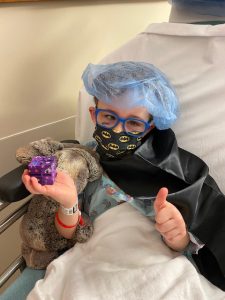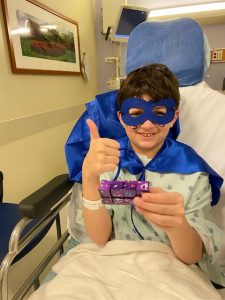“It’s something that will make many children very happy. If it helps them for even just a few minutes to take their mind off what’s going on, it’s a blessing.”
D.P. Smith III Supporter of the Wilmer Family Focus Fund, which provides the fidget toys
Johns Hopkins UniversityEst. 1876
America’s First Research University
A combination of clinical experience and research for her PhD spurred Lizzie Horn, a certified registered nurse anesthetist, to start playing with toys again.
It all began with a 4-year-old patient, explains Horn, who frequently works with pediatric patients at the Wilmer Eye Institute, Johns Hopkins Medicine. This patient visited Wilmer monthly for surgery, and would often refuse his preoperative eye drops or to go back to the surgical suite. “I wondered, how can we improve this experience for him?” says Horn.

Around the same time, Horn was researching patient anxiety and pain as a potential topic for her dissertation. Based on studies she had read, and asking her own children what they liked to play with, she decided to try a new tack: giving the young patient a fidget toy — a type of toy that provides a tactile experience.
“Now, when he gets here, he comes and finds me and walks right back with me. It’s pretty amazing,” says Horn.
Tina Tran, MD, chief of anesthesiology for the Wilmer Eye Institute, explains, “We were using distraction techniques such as electronics or music. And then we noticed the things that made children the calmest were both parental presence and having something in their hands to fidget with.”
These experiences inspired Horn and Tran to create an initiative to provide superhero capes and fidget toys to children who come to Wilmer for procedures that require anesthesia.
And it began just in time.
A few months into their efforts, the COVID-19 pandemic transformed the surgical experience for all patients. For pediatric patients at Wilmer, it meant parents could no longer accompany their children to the surgical suite during the process of putting the child under anesthesia.
“When they told me that because of COVID I couldn’t go in with him, I thought, ‘How are we going to do this? He’s not going to want to leave Mom behind,’” says Maria Butler, whose 5-year-old son Thomas had surgery at Wilmer in 2022.
But the day of his procedure, everything went well.
“They asked me if I would be OK with them offering Thomas a toy, and I said, of course. It was an individually wrapped cube that you manipulate into different shapes. And then they offered him two different color capes — a red one and a black one — and he chose the black one,” says Maria. “Those kid-friendly things relax kids and help in terms of feeling connected to the adults around them. It made him feel special, and he was OK with separating from his mom.”
“It’s something that will make many children very happy. If it helps them for even just a few minutes to take their mind off what’s going on, it’s a blessing.”
D.P. Smith III Supporter of the Wilmer Family Focus Fund, which provides the fidget toys
Randee Neal, the mother of another patient, Sam, points out an additional benefit of the fidget toys and capes. The toys help both the patient’s anxiety and that of the parents.
“Sam started playing with the toy, and not only did he not cry going into surgery — which eased my anxiety along with his because I wasn’t worried about my baby going to surgery crying — after the surgery, once the anesthesia had worn off, he immediately asked for that fidget toy,” says Neal. “When you’re worried about your baby having eye surgery, anything that takes anxiety off your child takes it off the parents.”
Neal also noticed the toy was a great way to track Sam’s postoperative progress. When she watched him playing with the toy, she realized, “Obviously he is seeing perfectly because he’s moving this fidget toy around.”

At first, the fidget toy initiative was funded out of pocket. In 2021, however, a charitable fund was established to support it, called the Wilmer Family Focus Fund. One philanthropic supporter of the fund, D.P. Smith III, is an author of two successful books and is currently writing another — this one about Baltimore Colts quarterback Johnny Unitas.
At Wilmer one day, Smith noticed the waiting room in the pediatric division, and it brought back memories from six years previously when he spent a week with his nephew, who was at a children’s hospital in Boston for a heart transplant. “I was able to see the brave little children in that hospital battling, and I was just amazed at the spirit they had considering the challenges before them,” says Smith.
Seeing the brave children at Wilmer, coupled with the memory of what he had witnessed in Boston, moved Smith and his wife, Pamela, to support the Family Focus Fund. “It’s something that will make many children very happy. If it helps them for even just a few minutes to take their mind off what’s going on, it’s a blessing,” says Smith.
Tran and Horn have plans to extend the initiative, and are excited to have the funds to dream a little bigger. “We’re finding ways that we can be creative and make it very patient-centered and family-focused so that everybody feels like it’s a good day and a good experience for the child,” says Tran.
This story first appeared on the Johns Hopkins Medicine website.
Topics: Friends of Johns Hopkins Medicine, Wilmer Eye Institute, Promote and Protect Health